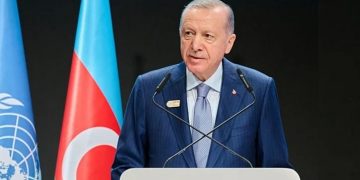Turkish President Recep Tayyip Erdoğan will play an enhanced role in management of the economy after the resignation of his son-in-law Berat Albayrak as treasury and finance minister, according to a top local columnist.
On Tuesday, Erdoğan appointed party insider Lütfi Elvan, a former deputy prime minister, to replace Albayrak, who stepped down on Sunday. He also sacked Central Bank Governor Murat Uysal at the weekend and appointed Naci Ağbal, his chief of strategy and budgetary affairs, in his place.
“Lütfi Elvan will manage the economy. Naci Ağbal will be responsible for maintaining price stability as the central bank governor. But President Erdoğan will be more active than ever,” said Abdulkadir Selvi, a columnist for Hürriyet, one of Turkey’s biggest-selling newspapers.
Selvi is known for his close connections to officials of Erdoğan’s government.
Erdoğan is under political pressure to stabilise the economy and ensure economic growth after the lira slumped to successive record lows against the dollar. But his unconventional views on the economy have disturbed investors and contributed to financial imbalances – the Turkish president, a devout Muslim, has opposed hikes to interest rates claiming they are inflationary.
Turkey is engaged in an historic struggle to prevent it from being held captive in the shackles of interest rates, exchange rates and inflation, Erdoğan said in a speech on Tuesday.
Elvan may prioritise different policy steps to Albayrak, but the basic aims of the government are unlikely to change, Selvi said.
“Of course, the management style and priorities of the two ministers is different. However, it is possible to see this (Elvan’s appointment) as renewal within an existing process,” he said. “Because in the new period, President Erdoğan is expected to be more involved.”
Erdoğan is a politician who knows how decisive the economy is to voter choices and the popularity of his governing Justice and Development Party (AKP), Selvi said.
“The economy plays a key role in the AKP reaching 50 percent of the vote and winning elections,” he said. “For this reason, it is said that Erdoğan will spare more time for the economy in the new period. It is stated that Erdoğan has devoted a large part of his time to the economy, especially recently.”
Investors are turning to a meeting of the central bank’s Monetary Policy Committee on Nov. 19 to gauge whether the arrival of governor Ağbal will mean a return to monetary orthodoxy. Uysal left the benchmark interest rate unchanged at 10.25 percent in September, provoking a fresh sell-off in the lira. Annual inflation in Turkey is 11.9 percent.
The lira dropped to a record low of 8.5876 per dollar last Friday, taking losses for the year to more than 30 percent. It traded up 0.9 percent at 8.0725 per dollar on Wednesday, partly on anticipation that the central bank will hike interest rates at next week’s meeting.
Erdoğan’s government has used low interest rates to engineer a borrowing boom among consumers and businesses and to ensure that Turkey’s economy grows despite the outbreak of the COVID-19 pandemic.
Source : ahvalnews.com













